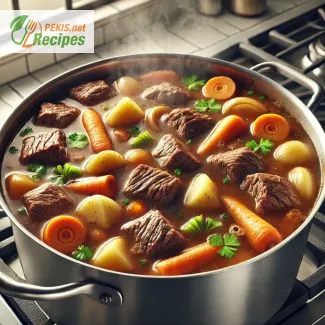
Perfect Homemade Beef Soup is a soul-warming, richly flavored dish that is as versatile as it is satisfying. Known for its comforting, hearty qualities, this soup combines the robust essence of beef with a medley of vegetables and seasonings, creating a dish that delights both the palate and the body. Beyond its basic ingredients, beef soup offers endless customization, allowing home cooks to adjust ingredients based on season, taste, and personal preference.
Usage of Beef Soup
This classic beef soup serves many purposes in the kitchen, making it a staple in countless households. Its appeal lies in its ability to be both a main course and a nourishing base for other dishes. Rich in protein, vitamins, and essential minerals, beef soup is more than a meal; it's a source of energy and nourishment. Some popular ways to enjoy beef soup include:
- Main Meal: A steaming bowl of beef soup, often paired with crusty bread, makes for a satisfying, nutrient-dense meal.
- Base for Stews and Casseroles: The soup can act as a foundation, infusing its flavors into stews, casseroles, or even pasta dishes.
- Broth for Noodles: Pour over noodles or add in cooked grains like barley, rice, or quinoa for an even heartier option.
- Meal Prep Favorite: Due to its incredible shelf life and the ease of making large batches, homemade beef soup is ideal for meal prepping, freezing, and reheating throughout the week.
Types of Beef Soup
Beef soup comes in various forms, each catering to different culinary preferences and ingredient availabilities. Here are some of the popular types of beef soup you might explore:
1. Classic Beef Vegetable Soup
This version includes a mix of root vegetables like carrots, potatoes, and celery combined with beef chunks or shreds. Seasoned simply with herbs such as thyme, rosemary, and bay leaves, it is a perfect choice for a balanced, home-cooked meal that emphasizes flavor and simplicity.
2. Beef Barley Soup
Barley adds a unique, chewy texture and a nutty taste, making this soup a favorite among those looking for a more filling option. Beef barley soup typically includes a range of vegetables like mushrooms, carrots, and onions, blending them into a rich, beefy broth that’s thicker and denser due to the grains.
3. Beef Mushroom Soup
For a more luxurious, earthy flavor, mushrooms are paired with tender beef pieces. The combination of umami-rich mushrooms with simmered beef stock creates a deep flavor profile, enhanced with herbs such as parsley or oregano. This variation is known for being hearty yet light, perfect for those who prefer a lower-carb soup option.
4. Beef Noodle Soup
Similar to the popular chicken noodle soup, beef noodle soup is comforting and easy to digest, making it a perfect choice for anyone in need of simple nourishment. With a savory broth, tender beef pieces, and wide egg noodles, this soup is often enhanced with garlic and ginger, offering a warming quality that is both aromatic and flavorful.
5. Spicy Korean Beef Soup (Yukgaejang)
A traditional Korean variation, Yukgaejang is a spicy, tangy beef soup that incorporates ingredients like bean sprouts, green onions, and chili powder for an extra kick. The result is a soup that’s fiery, bold, and incredibly satisfying, perfect for those who appreciate spicy flavors.
6. Beef Pho
This Vietnamese soup is known for its aromatic spices and clear broth made by simmering beef bones, onions, and ginger. Topped with thinly sliced beef, bean sprouts, fresh herbs, and rice noodles, beef pho offers a refreshing, light, and deeply savory experience. Typically served with lime, chili, and fish sauce on the side, it’s a globally cherished soup with a unique balance of flavors.
7. Beef and Potato Soup
A straightforward yet comforting soup that highlights the tenderness of beef alongside soft, hearty potatoes. Usually seasoned with simple spices like black pepper and paprika, this version is a go-to when you’re looking for a straightforward and satisfying meal.
Perfecting the Flavor in Homemade Beef Soup
Achieving the perfect flavor in a homemade beef soup relies on the quality of ingredients and cooking techniques. Below are some techniques that elevate the taste:
- Browning the Beef: Browning beef pieces before adding them to the soup brings out a deeper, caramelized flavor. This step enhances the final taste by adding complexity to the broth.
- Slow Simmering: Cooking beef soup on low heat allows the marrow in beef bones or tougher cuts to release nutrients and flavors, enriching the broth.
- Incorporating Fresh Herbs and Spices: Fresh herbs like parsley, thyme, and bay leaves add a bright contrast to the beef’s rich taste, while spices such as paprika, black pepper, and coriander bring warmth and complexity.
- Using a Mix of Vegetables: Carrots, celery, onions, and other root vegetables absorb the beef broth, providing natural sweetness that complements the savory depth.
- Balancing Acidity and Sweetness: Adding a splash of vinegar, lemon juice, or tomatoes can enhance the soup’s brightness, balancing the richness of the beef.
- Finishing with Fresh Garnishes: Adding garnishes like fresh parsley, green onions, or a sprinkle of pepper enhances both presentation and taste, adding a burst of freshness.
Why Homemade Beef Soup is a Must-Try
The appeal of homemade beef soup lies in its adaptability and nourishing quality. A bowl of well-made beef soup is filled with lean protein from beef, fibers from vegetables, and essential vitamins and minerals. Beyond being a great cold-weather comfort food, it’s also suitable for meal prep as it stores well and often tastes even better after a day or two, as the flavors deepen.
In a culinary landscape filled with quick fixes and convenience foods, perfecting a homemade beef soup is a timeless skill. It’s a soup that brings comfort, nutrition, and satisfaction, serving as a cornerstone of traditional, home-cooked meals that brings warmth to the table. Whether you’re crafting a classic beef vegetable soup or exploring flavors with a spicy Korean variation, homemade beef soup is a recipe that always has something new to offer.
Enjoying a bowl of Perfect Homemade Beef Soup is like wrapping yourself in a warm blanket on a chilly day—inviting, hearty, and fulfilling in every way.
Step-by-Step Preparation:
- Heat the Oil: In a large pot or Dutch oven, heat the olive oil over medium-high heat.
- Brown the Beef: Add the beef pieces and brown on all sides (approximately 5 minutes). This will add depth and flavor to your soup. Once browned, remove the beef from the pot and set it aside.
- Sauté the Aromatics: In the same pot, add the chopped onions and cook until they are soft and translucent, about 4 minutes. Add minced garlic and sauté for an additional minute until fragrant.
- Add Vegetables: Stir in the carrots, celery, and potatoes. Cook for about 3 minutes, stirring occasionally, to allow the flavors to meld.
- Deglaze with Broth: Return the browned beef to the pot and pour in the beef broth, stirring to deglaze the pot and release any browned bits from the bottom.
- Add Seasoning: Add the bay leaf, thyme, rosemary, salt, and black pepper to taste.
- Add Tomatoes: Stir in the crushed tomatoes and bring the mixture to a gentle boil.
- Simmer: Reduce the heat to low, cover the pot, and let the soup simmer for 1.5 hours. This slow cooking will tenderize the beef and allow the flavors to develop fully.
- Check for Tenderness: After 1.5 hours, check the beef and vegetables for tenderness. Adjust the seasoning with salt and pepper if needed.
- Garnish and Serve: Remove the bay leaf and ladle the soup into bowls. Garnish with fresh parsley if desired and serve warm.
The Perfect Homemade Beef Soup is not only flavorful but also packed with nutrients that benefit the body in multiple ways. This dish combines high-quality proteins, vitamins, and minerals, offering both short-term and long-term health advantages.
1. Proteins (Beef)
- Beef provides a rich source of protein, crucial for muscle growth, repair, and overall cell health. Protein is essential for sustaining muscle mass, especially important as we age.
- It is also a source of complete proteins, meaning it contains all nine essential amino acids, which the body cannot produce on its own.
2. Iron (Beef)
- The iron in beef is in the heme form, which is more readily absorbed by the body than non-heme iron found in plants. Iron is vital for producing hemoglobin in red blood cells, responsible for oxygen transport throughout the body.
- This helps prevent iron deficiency anemia, a common issue that can lead to fatigue, weakened immunity, and poor concentration.
3. Vitamins (Primarily from Beef and Vegetables)
- Vitamin B12: Beef is rich in Vitamin B12, essential for nerve function, DNA synthesis, and red blood cell formation. A B12 deficiency can lead to neurological issues and fatigue.
- Vitamin C (from carrots and tomatoes): This vitamin supports the immune system and enhances iron absorption, promoting healthier red blood cell production.
- Vitamin A (from carrots): Known for supporting eye health, vitamin A also plays a role in immune function and skin health.
- B Vitamins (from beef): Beef supplies a range of B vitamins, including B6 and niacin, which aid in energy production, brain health, and cell repair. These vitamins are especially valuable for managing stress and sustaining energy levels.
4. Minerals (Primarily from Beef and Vegetables)
- Zinc (Beef): Zinc is essential for immune health, wound healing, and DNA synthesis. It also contributes to cognitive health and is beneficial for skin.
- Potassium (from potatoes): Potassium is critical for regulating blood pressure and supporting heart health by counterbalancing the effects of sodium in the body.
- Magnesium (found in vegetables like celery): Magnesium helps muscle and nerve function, supports bone health, and aids in the regulation of blood glucose levels.
5. Carbohydrates (from Potatoes and Carrots)
- Complex Carbohydrates in potatoes and carrots provide sustained energy without causing rapid blood sugar spikes, making this soup a stable energy source. Carbohydrates fuel both brain and body functions, keeping you mentally and physically energized.
- Fiber: Carrots, potatoes, and celery add dietary fiber, which is essential for digestive health. Fiber not only aids in digestion but also helps regulate blood sugar levels and can lower cholesterol.
6. Healthy Fats (from Olive Oil)
- Olive oil is rich in monounsaturated fats, known for their role in reducing bad cholesterol (LDL) while maintaining good cholesterol (HDL) levels, contributing to overall heart health.
- Olive oil also contains antioxidants like Vitamin E, which protect cells from damage caused by oxidative stress, potentially lowering the risk of chronic diseases.
7. Antioxidants (Garlic, Onions, Tomatoes)
- Garlic and onions are known for their high levels of antioxidants and natural anti-inflammatory compounds, which can boost immunity and help the body resist infections.
- Lycopene (from tomatoes): Lycopene, a powerful antioxidant, supports heart health and reduces inflammation. Regular consumption of lycopene is linked to a reduced risk of certain cancers, especially prostate and lung cancer.
8. Low Sodium Option
- Since this soup is homemade, it allows for better control over sodium levels than store-bought versions. While some sodium is necessary for fluid balance and nerve transmission, excessive sodium intake is a concern for blood pressure. Adjusting salt levels makes this recipe more heart-healthy.
Potential Health Benefits
- Heart Health: The monounsaturated fats from olive oil, potassium, and controlled sodium make this soup beneficial for the cardiovascular system. Additionally, the fiber from vegetables may help to manage cholesterol levels, further supporting heart health.
- Immune Support: The combination of vitamins (C, A, and B6), zinc, and antioxidants like lycopene makes this soup a great choice for immune system support. Regular consumption of these nutrients can improve the body’s resistance to illnesses and speed up recovery times.
- Weight Management: This soup is low in calories but high in protein and fiber, promoting a sense of fullness without an excess of calories. Protein and fiber help control appetite and prevent overeating, which is beneficial for maintaining a healthy weight.
- Bone Health: With minerals like magnesium and a range of vitamins from both the beef and vegetables, this soup supports bone health. Vitamin K (from leafy vegetables in variations) and magnesium are particularly important for bone density.
Allergen Considerations and Substitutions
Some common allergens in this soup include celery and beef, which can be replaced as follows:
- Celery Allergy: Substitute with fennel or zucchini, as they provide a similar texture and mild flavor without the allergenic compounds found in celery.
- Beef Sensitivity: Substitute with chicken or turkey for a similar protein profile, or use legumes like lentils for a vegetarian option that still offers protein and fiber.
This Perfect Homemade Beef Soup is more than a comforting dish; it’s a nutritionally well-rounded meal that nourishes and supports multiple systems in the body. The soup provides high-quality proteins for muscle health, complex carbohydrates for steady energy, and essential vitamins and minerals that benefit immunity, heart health, and bone strength. Rich in nutrients and flavor, it’s an ideal choice for a wholesome and satisfying meal.
Including Perfect Homemade Beef Soup in Your Diet
The Perfect Homemade Beef Soup can be a beneficial addition to a balanced diet, ideally enjoyed 1 to 2 times per week. As a rich source of protein, vitamins, and essential minerals, it provides a complete meal that is both satisfying and nourishing. The high-quality protein from beef supports muscle health, while the fiber and complex carbohydrates from vegetables help maintain stable energy levels. This dish offers a variety of nutrients without being overly calorie-dense, making it an ideal choice for those looking to manage weight and maintain a nutrient-rich diet.
General Advice
- Portion Control: While this soup is nutrient-dense, it’s also high in protein, which can be taxing on the body in excessive amounts. A single bowl (around 300–400 ml) is typically sufficient for a meal, providing ample nutrition without overloading the system.
- Variation and Seasonal Adaptations: Consider adjusting the vegetables according to seasonality. In the summer, add zucchini or bell peppers for a lighter twist, while in winter, root vegetables like parsnips or turnips add extra warmth and depth.
- Reducing Sodium: Homemade soups allow for more control over salt content, making it a heart-healthy option. Use low-sodium beef broth or reduce the added salt if you are watching your sodium intake.
- Storage and Meal Prep: This soup is excellent for meal prep, as flavors deepen over time. Store it in airtight containers in the refrigerator for up to 4 days or freeze portions for up to 3 months. Reheat as needed for a convenient, ready-made meal.
- Balance with Fresh Ingredients: Since this soup is filling and protein-rich, balance it out on other days with lighter meals, such as salads or vegetable-based dishes, to maintain variety in your diet.
Including this beef soup in your weekly meal plan can enhance your diet with vital nutrients while also providing a cozy, homemade meal that supports both physical health and culinary satisfaction.
This recipe may contain the following allergens:
- Celery (common allergen in soups and stews)
- Tomatoes (in some cases, tomatoes can cause reactions for those sensitive to nightshades)
Allergy-Friendly Substitution Tips:
- Celery Substitute: Replace celery with a different aromatic vegetable like fennel or zucchini, which can provide a similar texture.
- Tomato-Free Option: For those avoiding tomatoes, try substituting with a mixture of red bell pepper and pumpkin purée to maintain color and add a subtle sweetness.
This hearty, traditional soup is versatile and can be adapted for a variety of dietary preferences. Enjoy the warmth, depth, and comfort of this Perfect Homemade Beef Soup!





